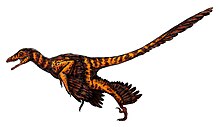
Now we come to the final part of the Jurassic Park series, ending with perhaps the most controversial aspect of the movie: the depiction of the Dilophosaurus (Welles, 1970). Namely, this will involve examining Dilophosaurus' size and whether it possessed a frill and venom.


In the movie, Dilophosaurus is depicted as being about 91 cm high and 1.5 m long (Shay and Duncan, 1993). In reality, however, Dilophosaurus was larger, measuring up to 7 m long and perhaps weighing up to a ton (Holtz, 2012). Interesting that, in the movie, Velociraptor was depicted to be larger and Dilophosaurus smaller.


(Segisaurus)
In the movie, Dilophosaurus was depicted as having a frill. Whilst there is no evidence that Dilophosaurus possessed such a feature, it has been proposed for one of its relatives, Segisaurus (Camp, 1936). Charles Camp believed Segisaurus had a small frill along each side of its neck to make the animal more aerodynamic as it ran. This later turned out to be an error.


(Sinornithosaurus)
Venom is another aspect of Jurassic Park's Dilophosaurus that the real thing didn't have. Again, however, it has been proposed for a relative, in this case the dromaeosaurid ("raptor") Sinornithosaurus (Xu et al., 1999). This claim was made based on grooves found on the teeth and cavities in the jaws that were interpreted as being venom glands (Gong et al., 2009). However, another study could find no evidence of these supposed venom glands (Gianechini et al., 2011). The debate continues with some agreeing and disagreeing with the two studies.
So, actually, other than the size of Dilophosaurus, its depiction in Jurassic Park is not entirely unfounded. Fanciful maybe, but still plausible. Next time, we'll look at some more dinosaur heads.
References
Camp, C. 'A new type of small bipedal dinosaur from the Navajo sandstone of Arizona', University of California Publications in Geological Sciences, 24 (2), pp. 39-56
Gianechini, F., Agnolin, F. and Ezcurra, M. (2011) 'A reassessment of the purported venom delivery system of the bird-like raptor Sinornithosaurus', Paläontologische Zeitschrift, 85 (1), pp. 103-107
Gong, E., Martin, L., Burnham, D. and Falk, A. (2009) 'The birdlike raptor Sinornithosaurus was venomous', Proceedings of the National Academy of Sciences, 107 (2), pp. 766-768
Holtz, T. (2012) Dinosaurs: The Most Complete Up-to-Date Encyclopedia for Dinosaur Lovers of All Ages, New York City: Random House
Shay, D. and Duncan, J. (1993) The Making of Jurassic Park, London: Boxtree Ltd
Camp, C. 'A new type of small bipedal dinosaur from the Navajo sandstone of Arizona', University of California Publications in Geological Sciences, 24 (2), pp. 39-56
Gianechini, F., Agnolin, F. and Ezcurra, M. (2011) 'A reassessment of the purported venom delivery system of the bird-like raptor Sinornithosaurus', Paläontologische Zeitschrift, 85 (1), pp. 103-107
Gong, E., Martin, L., Burnham, D. and Falk, A. (2009) 'The birdlike raptor Sinornithosaurus was venomous', Proceedings of the National Academy of Sciences, 107 (2), pp. 766-768
Holtz, T. (2012) Dinosaurs: The Most Complete Up-to-Date Encyclopedia for Dinosaur Lovers of All Ages, New York City: Random House
Shay, D. and Duncan, J. (1993) The Making of Jurassic Park, London: Boxtree Ltd
Welles, S. (1970) 'Dilophosaurus (Reptilia, Saurischia), a new name for a dinosaur', Journal of Paleontology, 57, p. 407
Xu, X., Wang, X-L, and Wu, X-C. (1999) 'A dromaeosaurid dinosaur with a filamentous integument from the Yixian Formation of China', Nature, 401, pp. 262-266
Xu, X., Wang, X-L, and Wu, X-C. (1999) 'A dromaeosaurid dinosaur with a filamentous integument from the Yixian Formation of China', Nature, 401, pp. 262-266
No comments:
Post a Comment